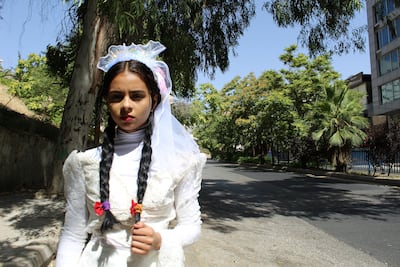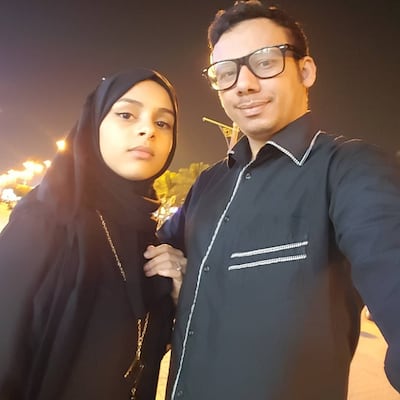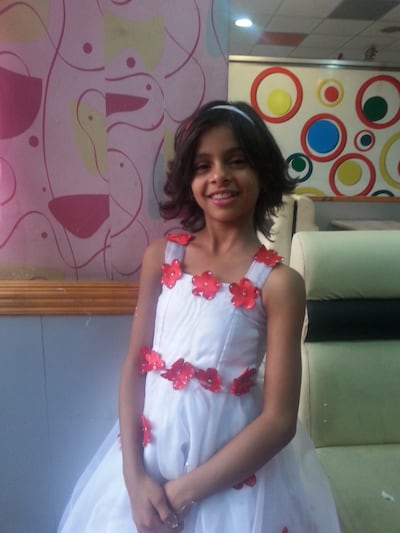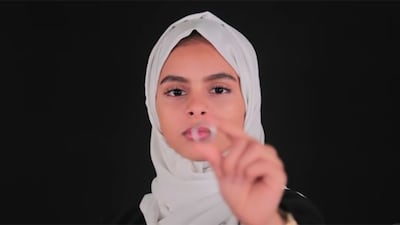When Nada Al Ahdal accepted an Arab Women of the Year award for social awareness at a star-studded ceremony in London this year, the child bride activist wore white.
It is her favourite colour — as though, in her fight against an abhorrent, centuries-old custom, Al Ahdal has defiantly reclaimed something symbolic of the pain and grief that marked her early years in Yemen.
“Seeing the suffering of my sister when she tried to commit suicide the same way my aunt did by burning herself … unfortunately, I didn’t have the childhood I was supposed to,” she tells The National.
“Especially when my parents decided to end my life by selling me in the name of marriage to a man when I was only 11. Our place, as a child, is in school playing, feeling safe around our parents, not threatened by them.
“I knew that white wedding dress would burn me like it did my aunt and my sister.”

Horrified at the result of the hopelessness that overwhelmed her aunt Hashima, 14, and eldest sister Nadia, 13, Al Ahdal resolved not to be the family’s next child bride victim.
The journey to save herself propelled the young Al Ahdal to international attention, with interest sustained ever since by the campaign she leads to give victims an escape route like the one her uncle Abdelsalem provided.
“Not every girl will find a man or a relative who will protect her from child marriage,” she says. “That’s why we speak out for the girls, so people give them attention and see what’s going on in some Arab countries – not only in Yemen.”
With “Girls Not Brides” at the heart of its mission, the Nada Foundation enshrines education as a fundamental right of children, and the means of social change and economic growth.
Several of its programmes aim to form “a bridge” to the rest of the world, offering English lessons to girls aged 13 to 18 displaced by domestic violence, conflict, early marriage or other abuses, and access to remote learning through international universities.
They will, if she has her way, become the future peacemakers, journalists, activists, political leaders and humanitarians who will rebuild Yemen after the war.
It is apt that the foundation enabled Al Ahdal’s own education. After fleeing her homeland, she lived in Saudi Arabia, Egypt, Jordan and Kenya, never remaining more than a year because she was either not allowed to study or did not have the right to stay.
An invitation to England to receive a With and For Girls prize at the Women of the World festival in 2020 set her on a new path.
“Moving from country to country when I was really, really young — it affected me a lot," she says. "My education stopped. So when I came to the UK I had to start from zero. I now have a year left in college but I’m doing great progress. I want to study international law.”
These days, Al Ahdal lives with Abdelsalem, whom she calls “Amo” (Arabic for uncle), in Newcastle, where she is sitting her GCSE mock exams in maths and English this week.

Any available downtime is spent capturing her lost childhood: making mischief with her adopted “brother” Akram, drawing, reading and indulging a passion for football, ice cream and billiards.
Abdelsalem might have cause to regret imparting the rudiments of the latter. “My uncle taught me, and now the student beats the teacher,” she jokes.
Music is another source of pleasure with Selena Gomez a particular favourite, as well as a Yemeni artist whose name escapes her. “He sings,” she says, before giving voice to a snippet of lyrics: “Aadek illa sagheer, badri aleik el hawa.”
The song is by Abu Bakr Salem and was inspired by the moment friends spotted his son, then nine, in intimate conversation with a girl his age.
Its wording — loosely translated as “you are still young, it’s too early to fall in love” — though arising from a different context, is not entirely out of place in Al Ahdal’s narrative.
When discussing the subject, she does not rule out the possibility of dating but it is clearly a distant priority even as a woman now at the age of 20.
“I have a lot of work to do,” Al Ahdal says. “Girls need me to save their lives so that’s my focus. I don’t want to be a housewife now or in the future. I want to be a change-maker.”
The sound of her voice is stunning in spite of her protests to the contrary, and testament to the singing group that Abdelsalem would take the young Nada to perform with in Sanaa.
Those sessions were among the few positive memories she has of childhood when she dreamt of moving to the capital from the family home in Zabid to study medicine or teaching.
Their recollection, though, is invariably marred by thoughts of the precious times that she played and sang with Hashima.

“My aunt was my best friend. After she got married, they would not allow me to play with her because of the idea that married girls were not allowed to play with single girls. We were children. She was a child.”
A year later, Hashima was dead after dousing herself in petrol and lighting it, leaving behind an infant daughter. Al Ahdal is still haunted by a photograph of her aunt, face blackened, in a death shroud, and speaks of the hatred she bears for the man whose physical and mental cruelty drove her to suicide.
“She had no hope so she had to end her life. I saw the picture of her burnt and dead, and then my sister followed,” she recalls, though Nadia survived.
Al Ahdal tended to Nadia’s self-immolation wounds, bringing water and food, little suspecting that she had been put forward as her sister’s matrimonial replacement.
“She was lying down in bed, and it was awful because my family told me my wedding would be in three days so that’s what made me run away," she says.
What she was yet to learn, Al Ahdal says, was that the marriage had already been formalised. All that remained was for the religious ceremony to be held.
She recounts an escape from an earlier arrangement made with a 26-year-old wealthy expatriate for $2,000 when she was 10 thanks to the intervention of her father’s brother. Abdelsalem, for his part, has said: “I could not allow her to be married off and have her future destroyed.”
His help was sought a second time but he was out of town on a business trip to Saudi Arabia and Al Ahdal turned to an acquaintance out of desperation.
The harrowing two-minute video she subsequently uploaded to reach him and refute her parents’ claim that she had been kidnapped went viral after a YouTube user added English captions.
“I escaped from my parents,” a tiny, wide-eyed Al Ahdal says. “I am 11 years old and my mum wants me to marry. Is there no mercy in their hearts? I would rather die. They threaten me with death if I go to my uncle. I would rather die than go live with them. They killed our dreams. This is a crime … a crime.”
The allegations of child bride pacts and the threat of an honour killing were denied by her parents, and questions were raised about their veracity by sceptics who accused her of making up parts of the story.
But activists and human rights groups rallied as the plea received nearly eight million views in three days, and it was later shown at the months-long National Dialogue Conference created under the Gulf initiative in 2011 to produce a new Yemeni constitution.
“Social media saved my life,” she explains. “After that, I came to believe in speaking out in the name of other girls and spreading awareness that will help save their lives. The people will turn into an army, defend, protect and find a solution for her. That’s what I’m trying to do now.”
Al Ahdal and her uncle appealed to the Yemeni Ministry of Interior, which, in conjunction with a child welfare organisation, detained her for 10 days during negotiations with members of the family.
In the end, the marriage was annulled, an agreement was put in place that no new pacts would be arranged before she was 18, and legal responsibility was transferred to Abdelsalem in, at times, stormy scenes filmed by CNN.
But if Al Ahdal had been astonished by the response from communities around the world, she was dismayed by that of her own.
She was the target of negativity from elements of Yemeni society angered at the public spurning of a practice all the more entrenched in recent years in a country plagued by poverty.
State officials pressured the Ministry of Interior and Al Ahdal says she was intercepted returning from an interview with a TV station in Lebanon.
She recalls having her passport confiscated, being held again, and made to sign a document banning comments about child marriage in the press or on social media.
Towards the end of 2015, the French publishing house Michel Lafon released her autobiographical La Rosee du Matin (The Morning Dew), and an invitation arrived for a book-signing event in Paris.
While attempting to leave through Aden, Al Ahdal says she and Abdelsalam were bundled into a military vehicle at gunpoint by Al Qaeda, driven to a compound, and interrogated.
“For the first three days, we didn’t see daylight — we were blindfolded. They were investigating, ‘Who is supporting you?'" she says, explaining the group's suspicion that she was being used as a puppet by a foreign country or NGO.
The uncle and niece were held for 14 days, she says, during which they could hear the screams of other captives — and sometimes their silence after the sound of a gunshot.
The militants, forced to relocate on December 6 by a car bomb attack claimed by ISIS that killed the governor of Aden, again blindfolded the pair, drove near to the abduction site, and released them.
Al Ahdal was offered a visa by Saudi King Salman and years later would step forward, radiant in that white shirt and trousers ensemble, to dedicate the prestigious London Arabia award to Crown Prince Mohammed bin Salman and the President of Egypt, Abdel Fattah El Sisi, for championing women’s rights.
In Riyadh, she met the Prime Minister of Yemen, Ahmed bin Dagher, and with his backing set up the Nada Foundation while continuing her education.
“But the head of the school said that I, being famous for showing social media about child marriage, would brainwash the other girls. She told me to study at home but I refused,” she says.
Eventually, Al Ahdal settled in England which, in many ways, represents what she wished for growing up. “I love everything about the UK. That’s the thing I was fighting to have. When I speak, I feel safe. I don’t feel like someone will harm me because I’m saying something against their tradition or ideas.”
She now stands as champion to countless girls, but it all began with Abdelsalem’s provision of safety, unstinting emotional and financial support, and hope as an exemplar of enlightenment.
“What made my uncle really different is education. That’s why we [at the foundation] believe in education," she says.
“He was seeing what was going on in my family, and knew it was wrong. That’s what I’m saying is a miracle because he is trying his best for a future for me. I don’t think every girl has this chance.”
The debt of gratitude to Abdelsalem includes his efforts at winning her parents round to the cause. During the most difficult discussions, Al Ahdal summoned thoughts of the ever-present danger of early betrothals faced by her five sisters.
All these years later, her shoulders hunch, the words come more slowly and her eyes well up, as she recalls the first encounter two days after the state took away guardianship.
“My mum said: ‘If my daughter comes back, I will break every bone in her body so she can’t walk again.’ After that, I bought a cake and flowers for her. She was so angry she threw everything on the ground and shouted many things like: ‘You’re not my daughter any more.’
“It took a long time but we managed. I’m really proud that they gave me a chance to speak to them and change their ideas. There’s not one girl in my family who is married or getting married before the age of 18.”
The importance of this conversion in propelling Al Ahdal onwards in her mission to stop young girls from being sold “like sheep” cannot be underestimated.
Her grandmother was married at nine, her mother at 13. The custom was followed by the family for generations, revisited as a matter of course on each woman down the line — until now.
She sums up the achievement simply but with a deep conviction: “I made them believe in girls’ rights.”
The one vow that the indomitable Al Ahdal was prepared to take willingly in childhood was to see to it that other families do the same.

